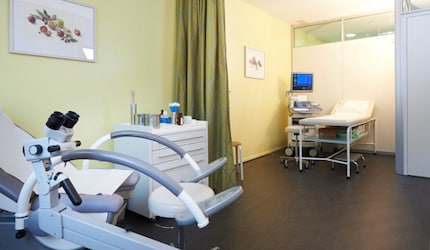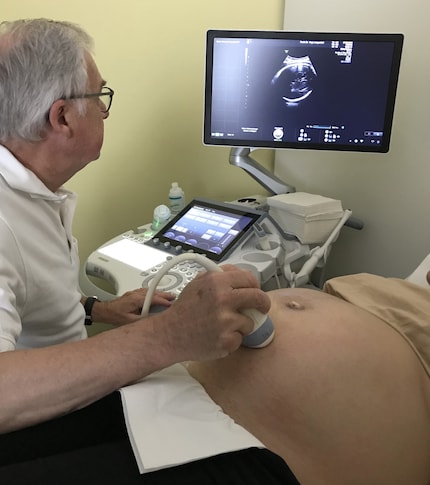
Guide
80 per cent of all gynaecologists are women
by Myrtha Brunner

Fertility decreases with increasing age. Nevertheless, one in three expectant mothers is over 35 years old. With almost 35 years of experience, gynaecologist Dr Hanspeter Vogt knows what is important when a woman wants to get pregnant.
In several conversations with childless women, I have realised that they hardly know anything about getting pregnant. "I'll read up on it when the time comes," says one friend. Another is surprised that she has to take folic acid as soon as she wants to have children. I have two children myself and now know how things work. Before I got pregnant, my two older sisters, who also have children, gave me plenty of advice. I realise that not all of us have this privilege. A reason for me to ask gynaecologist Dr Hanspeter Vogt about the most important facts about getting pregnant.
Let's start with conceiving a baby: for some women, it happens on the first try. Others practise for months or even years. What's the quickest way for a woman to get pregnant? What does she need to look out for?
Dr Hanspeter Vogt, gynaecologist: 80 per cent of all couples who want to have children become pregnant within a year. However, the chance per cycle is only 13 per cent. The quickest way for a woman to get pregnant is to not get hung up on it and to trust in nature and her body. Women should make sure that they consume enough folic acid (at least 400 micrograms per day) from the time they wish to have children. She should also avoid alcohol, nicotine, drugs and medication. Frequent sexual intercourse around ovulation is of course a good prerequisite. Consulting your gynaecologist can also clear up any misunderstandings.
I've heard that it can take longer to conceive if you're over 35 years old. Is there a correlation with the duration and age?
Yes, fertility decreases with increasing age. It is highest among 18 to 23-year-olds. Nevertheless, one in three women today is over 35 years old when she becomes a mother. Fertility may remain intact at least until the age of 46. This depends on the egg reserves in the ovaries. The dormant eggs in the ovary have a power plant (mitochondria) that has a certain lifespan and depletes over the years. It is worthwhile not to approach family planning "too late".
Another topic is "social freezing". This involves freezing unfertilised eggs over a period of years. However, this procedure is expensive and does not guarantee success. Today, it is still largely wishful thinking for the future.
Many women are afraid of being a high-risk pregnant woman. At what point does a woman have a so-called high-risk pregnancy?Increasing age increases the risk of complications. Especially from the age of 40 or if there are concomitant illnesses or risky behaviour. The risk of miscarriages and malformations also increases with age.
Now the desire to have a baby just won't materialise. What can a couple do and when is it worth asking the gynaecologist for help?
Since 80% of all couples without contraceptive protection become pregnant within a year, it is worth practising patience for a year. From the age of 35, I recommend waiting only 6 months. The gynaecologist will then initiate the necessary investigations to find out why it is not working. It is also possible to visit a fertility centre in Switzerland or abroad on your own initiative.

Is there generally a specific time when a woman who wants to have a baby should contact her gynaecologist? And what tips would you give the couple along the way?
Every woman of fertile age is asked about her desire to have a baby at her annual gynaecological check-up and is asked about her future plans regarding the desire to have children. The importance of taking folic acid before becoming pregnant is emphasised. A woman should start taking folic acid at least as soon as she wants to have children. It is not only good for the mother, but also reduces malformations in the embryo such as an open back, cleft lip and palate, a heart defect or a malformation of the urinary tract.
Health is the be-all and end-all when a woman wants to get pregnant. Do you recommend having a check-up beforehand?
A check-up is not necessary for most women. The women are generally young and healthy. However, they will be asked about their immunisation status. The most important is the rubella vaccination. A case of rubella in the first trimester of pregnancy can lead to malformations in the unborn baby. Iron stores and thyroid function can also be a topic for individual check-ups.
Regular visits to the dentist are also worthwhile. Pregnancy has an impact on the teeth and gums. For example, the increased blood flow can cause the gums to bleed more. Healthy dental hygiene (i.e. a lack of bacteria) also helps to prevent premature birth. To protect the child, a woman should not have an X-ray during pregnancy.
You have accompanied thousands of women during pregnancy. Are there any mistakes that a woman can make if she wants a baby?
A woman who wants to have a baby can't really make any mistakes, unless she waits too long to have a baby and her fertility suddenly comes to an end. The important thing is that she gets pregnant by the man she can imagine as the father of her children!
About men: Rumour has it that men should also prepare for pregnancy. This means not smoking, not drinking alcohol and eating a healthy diet a few months before "baby production". Is this true and why?
A healthy lifestyle is good regardless of becoming a father and not just with regard to pregnancy. You only become a father when your child is born anyway.

In addition to this rumour, there is also the myth that we can influence the sex of the baby at conception. Is this possible, and if so, how?
Actually, it is not possible. With every pregnancy, there is a 50 per cent chance that the child will be of the desired gender. However, it is possible to influence this to a certain extent. Male Y sperm are lighter, smaller, shorter-lived and faster than female X sperm. The X sperm are more robust, survive longer, but are slower. So if sexual intercourse takes place close to ovulation after a previous four-day period of abstinence, there is a theoretical possibility that the Y sperm will reach their destination more quickly. Accordingly, there should be a boy sooner. Conversely, if sexual intercourse does not take place exactly around ovulation, a girl is more likely to be conceived. But this is all without guarantee!
Occasionally, we "help" a patient who wants to have children by monitoring the maturation of the egg using ultrasound. As soon as the egg is mature, ovulation is triggered at the right moment with an injection. This process allows us to tell the woman the exact time of ovulation. Based on this, she knows when she needs to have sexual intercourse for it to occur. But even this is without guarantee!
Every time after the supposed conception, you have to wait and see. I have twice been one of the lucky 13 per cent mentioned above. So I never had to wait that long. As a result, the purchase of pregnancy tests was also limited. Are there certain signs of pregnancy that a woman should notice without having to take a test every time?
If a woman knows her menstrual cycle exactly, she can take a pregnancy test as soon as her period stops. The test makes no sense before that. Individual signs of pregnancy can appear early after the fertilised egg has implanted. These may include, for example, new cravings or an aversion to certain foods and flavours. But previously unknown tiredness, frequent urge to urinate, pulling in the lower abdomen, breast tenderness or nausea are also signs. However, not all women experience these symptoms. However, most soon realise that they are in "different circumstances" than before.
Hanspeter Vogt has been a specialist in gynaecology and obstetrics FMH since 1985. In his early years, he worked as a senior consultant at the gynaecological clinic of Münsterlingen Cantonal Hospital in the canton of Thurgau. He then became head of the gynaecological clinic at SRO AG Hospital in Langenthal (BE). He continues to pursue his passion even after his post as head physician. He opened the Gynaecological practice Talstrasse in Langenthal and continues to be an attending physician at SRO AG Hospital.
I’m the cook, cleaner, police officer, nurse, entertainer, motivator, author, storyteller, coach, organiser, chauffeur, lawyer and judge. To put it simply, I’m a mum to a daughter and not just a (Content) Manager at the office but also at home.
Practical solutions for everyday problems with technology, household hacks and much more.
Show all